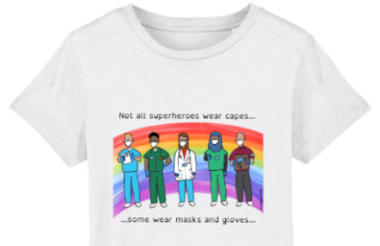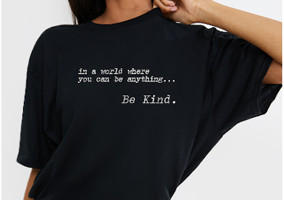Charity t-shirts launched by fashion brands have been popping up pretty much every week since the Covid crisis began. Often featuring a rainbow and/or a message of support, they most commonly raise money for the NHS.
A (by no means complete) list of famous brands that have launched one includes Boohoo, Pretty Little Thing, Asos, New Look and Missguided.
At first glance, they make a fantastic fundraising tool and have a number of advantages. As well as being highly instagrammable, they combine our basic human instinct to show support at a time of crisis with the impulse to use the therapeutic power of shopping to briefly forget the surreal situation we are in. Win-win.
While many have only just launched and fundraising totals have not been released yet, they are proving popular among the public, with certain models and sizes selling out. Asos alone expects to raise more than £100,000 from its “Heroes” collection of t-shirts and hoodies, a figure the retailer has promised to match.
New Look estimates profits from its t-shirts will amount to at least £46,000, half of which will go to NHS Charities Together's coronavirus appeal, and the other half to be divided between Hospice UK, retailTRUST and Teenage Cancer Trust.
However, these garments also raise a few ethical questions, both common to all charity t-shirts at any given time and specific to the lockdown era.
Workers’ safety
Even though physical shops are closed, most UK retailers are still open for online shopping. While this is enough to ensure customers’ safety, a lot of people still need to leave their houses and risk exposure to the virus in order for those t-shirts to be made, printed, packaged and delivered.
At the beginning of April, both Boohoo Group (which includes Pretty Little Thing) and Asos were featured in articles on the Guardian, which said warehouse staff were worried about their ability to stick to social distancing rules at work. Union Usdaw, which represents Boohoo workers at a major warehouse in Burnley, has called for the facility to close.
Both retailers denied the accusations. Asos published a statement on how it is protecting its employees, with its CEO saying that “health, safety and welfare of our people is my number one priority” and that the site has been inspected and approved by authorities. Similarly, Boohoo said that they “have implemented extensive self-distancing and hygiene measures to protect our colleagues” which have been reviewed by the authorities.
Boohoo also said full pay is being given to staff who are off sick or have to self-isolate, something Missguided and Asos could not confirm. Missguided declined to comment, Asos said it is “following government guidance at a minimum” and that arrangements would depend on where employees are based and length of service.
This is a widespread issue, and not just for the fashion industry. With statutory sick pay at £95.85 a week, workers are hardly incentivised to stay at home if they are experiencing mild symptoms.
Suppliers
A second key factor to consider, and potentially to ask fashion corporate partners about, is how they are dealing with suppliers around the world.
It is no secret that fast fashion retailers often have their garments manufactured abroad, mostly in Asian countries where production costs are low. Making sure that working conditions are adequate is complicated at the best of times.
The coronavirus crisis has added a further layer of complexity. Lockdown is wrecking havoc on the fashion industry as a whole, with the closure of shops causing a massive drop in sales that is inevitably reflected down the supply chain. Cancelled orders mean that millions of jobs in clothing factories are at risk, with the situation in Bangladesh being particularly critical. For this reason, there has been mounting pressure on brands to honour their commitments to manufacturers.
Among charity t-shirt producers, Boohoo said they “have honoured all of the orders that we have placed”, while Asos is cancelling around £5-6m worth of orders at cost value, which according to the company amounts to “less than 1% of our total spring/summer 2020 intake”. Missguided declined to comment.
UN agency International Labour Organization (ILO) has published a Call to Action asking organisations and governments “to take action to protect garment workers’ income, health and employment and support employers to survive during the Covid-19 crisis”. The document was published on 22 April and asks retailers to commit to paying manufacturers for finished goods and goods in production, and to “promoting respect for the ILO core labor standards, as well as safe and healthy workplaces”.
Endorsers include H&M, M&S, Primark and Next among others, but not Boohoo, Asos, Missguided or New Look. The Ethical Trading Initiative (ETI), which aims to improve working conditions globally, has also endorsed the Call to Action and urged members to do the same. Asos, Missguided and New Look are all ETI members, while Boohoo is not.
Environmental issues
Finally, despite how desperately we all are in need of good news, climate change is not among the events that coronavirus has cancelled.
Fast fashion is spectacularly bad for the environment. Figures from WRAP estimate that more than 300,000 tonnes of clothing is incinerated or goes to the landfill in the UK every year. The fashion industry makes up for 10% of all humanity's carbon emissions.
Charities have had to become more conscious of their environmental impact in the past years, and making fundraising more environmentally sustainable remains a necessity, even at such a time of crisis.
Thinking about how merchandise is produced and disposed of is a big part of that. When it comes to charity t-shirts, some smaller brands have made efforts to offer more sustainable and environmentally conscious products to the public.
For example, Capeless Heroes is a charity t-shirt collection launched by a company called KPN Merchandise together with artist Rebecca Osborne, whose profits will go to the NHS Charities Together appeal. It has an impressive list of sustainability certifications. The company was due to launch an ethical clothing range last month, but had to put it on hold due to coronavirus, and is now hoping to offer its services to other charities.
Similarly, these NHS t-shirts sold by Kindred are made from organic cotton, print in a renewable energy powered factory in the UK and delivered in plastic-free packaging.
Should you buy a charity t-shirt?
So, what does this all mean for charities and consumers? Are charity t-shirts are a bad idea? Should you buy one? Should your charity create one?
Like with many things these days, there is no easy, straightforward answer. It is only reasonable that charities that are facing an unprecedented crisis and dramatic income losses would look at all fundraising tools available.
But whether you are a member of the public looking to buy a t-shirt, or a charity fundraiser pondering a possible income channel, it is worth asking these questions and carefully consider whether the pros outweigh the cons before making your purchase or putting together your new corporate pitch. It is also worth looking at whether smaller, more ethical brands are a better choice compared to a major retailer.
Times are hard and this crisis is a huge challenge for the sector – but environmental and human sustainability should be part of any solution we come up with.
Related articles












